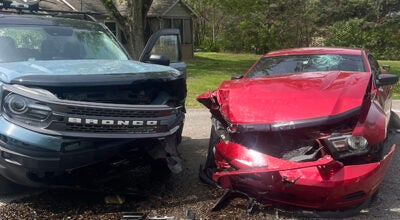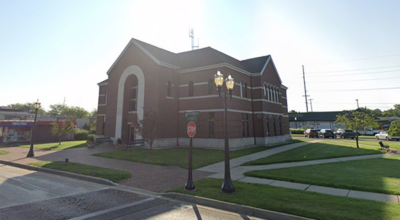In the center of the storm
Published 8:44 am Wednesday, August 13, 2014

Anthony Squiers, a 1997 graduate of Dowagiac Union High School, recently returned home on holiday from the University of Kurdistan Hewlêr in Iraq. The professor has taught in the war-torn region since February. (Leader photo/TED YOAKUM)
Dowagiac native reflects on time teaching in Iraq
Having lived in the city of Erbil since February, Anthony Squiers has grown used to the daily in-and-out of the hub of the Kurdistan Region of Iraq.
Besides the commute from his apartment to his job as a faculty member at the University of Kurdistan Hewlêr, Squiers visits many of the same places he would in the U.S.
“I go to the mall, to the bar, to restaurants when I feel like dining out,” Squiers said. “It’s still
business as usual for me.”
The Dowagiac-native said his daily routine is similar to that of most of the 2.4 million people living in the Kurdish capital, which sits less than 30 miles removed from the violent conflict between the region’s military forces, the Peshmerga, and insurgents with the Islamic State (IS).
“The people here have been through a lot of violence in their history, especially over the last few decades,” Squiers said. “I think they’re tired of it, but they’re doing their best to carry on in times like these.”
The conflict between Kurdistan, the semi-autonomous portion of Iraq with a population of six million Kurds, and the terrorist organization has escalated in recent months. The better trained and more numerous Kurdish militia has been forced back near the capital by the IS insurgents, who are equipped with artillery and other weapons stolen from American-armed Iraqi soldiers.
The U.S. has recently been drawn into the fighting, fielding airstrikes against IS convoys and positions. However, President Barack Obama and his administration have been hesitant to commit soldiers on the ground to help the Peshmerga repel the attackers.
“Our belief is that U.S. intervention is desirable and warranted at this point,” Squiers said. “I would also like to see a more broad coalition formed to address the problem.”
Known as the “the other Iraq,” Kurdistan and its people have a culture and language that sets it apart from the rest of the country. The Kurds, who are predominantly Sunni Muslims, share many core values in common with the U.S. and other western nations, such as belief in democracy, human rights, tolerance and diversity, Squiers said.
While these tenets have made the Kurds a natural ally of the U.S., it has also caused them to be a frequent target of fundamentalist terrorist groups such as IS.
“IS rejects their values, and has no tolerance for opposing viewpoints,” Squiers said. “To them, it’s a sin, it’s heresy. We have seen them in Syria and Iraq, and they have demonstrated no tolerance whatsoever.”
The professor said he feels an obligation to support his new neighbors in their struggle. Despite only moving to the region this year, the educator has traveled the globe since graduating from Dowagiac Union High School in 1997, studying in Germany and the U.K. and visiting other Middle Eastern nations such as Turkey and Qatar.
When offered a faculty position at the University of Kurdistan, Squiers was willing to accept the dangers of working in a volatile environment in order to cultivate the minds of future leaders in a rapidly expanding region.
“I saw it as an opportunity to help build a nation, to help advance a people and region that has a lot of potential,” he said.
One of the more interesting observations that Squiers has made since moving to the country is the dichotomy between major cities such as Erbil, which have high-end hotels, chain restaurants, and other amenities one would see in a metropolis of a developed nation, coexisting alongside farms that are still using cultivating methods used during the Mesopotamian era, he said.
“The education system in Iraq doesn’t achieve the level we want it to be at, but we’re working on it,” Squiers said. “By and large, our students at the University of Kurdistan are the top students in Iraq.”
The politics instructor has grown quite close to his students over the last several months. In the process, he has learned about them and their culture, which has been the target of terrorism and genocide for years.
“We have lots of students who have lost family members to car bombings, kidnappings or something else,” Squiers said. “A lot of others have relatives who are fighting on the front lines with the Peshmerga, who they are constantly worrying about.”
Despite the fighting that surrounds them, the pupils remain devoted to their education, as their studies will help mold them into the next generation of Kurdish business and political leaders, Squiers said.
While the future that awaits the region still remains unclear, for now, the residents of Erbil will continue on with their daily lives. Students and staff will return to the university in the fall, where classes are scheduled to begin as originally planned.
“I have full confidence in the future of Kurdistan,” he said. “They’re going to be OK.”






